flash mob
Although I took pictures on the phone/pda (my excuse for their poor quality), the real excitement of Tuesday's Flash Mob was hearing not seeing.
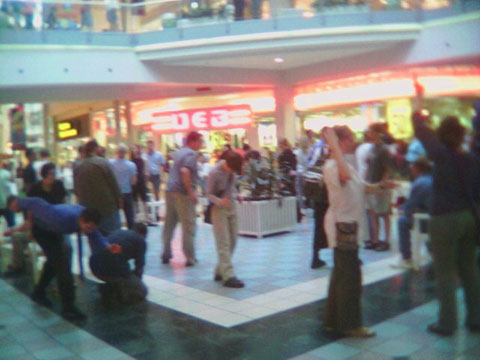
Pre-mob, while hastily searching for a wide-brimmed hat, I was holding micro-debates with myself on the meaning of this type of activity. Historically speaking, I wanted to relate it to Situationist philosophies of performance, but it seemed to absolutely defy any kind of political reading. Then it hit me: the Mall of America -- perhaps humankind's greatest attempt to construct a politically void environment -- was the ideal setting for an event that we might call post-political. After all, the first time I was in the Mall (10+ years ago), it was the sound that I first noticed. If you stand at the top floor and listen over the railing, you'll hear this monotonous hummmmmmm... neither raising nor lowering in pitch. You eventually start to realize it's the sound of consumption, the engines of purchase power.
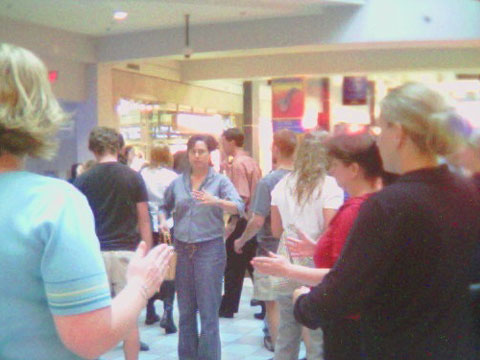
That sound was punctuated by the voices of confused shoppers on Tuesday. Here are some voices I overheard: "What are they doing?" "A what mob?" "Is someone famous in there?" "Why are they all watching Lord of the Rings in the Bose store?" "Are they actors?" "Are they dancers?" "Should we join them?"
So to all those people who have asked me about the "political" dimensions or the "meaning" of the event, I'll say this: I'm fairly certain there are no overtly ideological aspects to flash mobs -- they probably actually illustrate the erosion of the word "political" itself. But I do know it made a large number of people confused. Confusion is good.
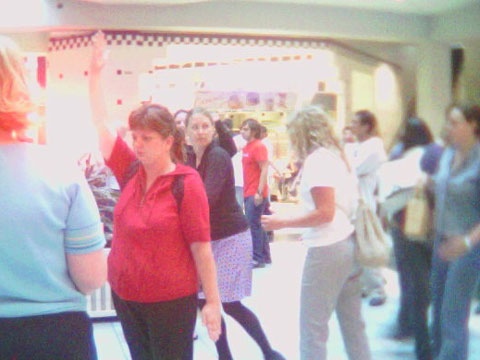
Walking into Player's around 6:00 to hand out scripts, there was already a line of people looking for a wide-brimmed hat. I was proud of my hat -- heck, since I'm talking the talk, I'll be so bold as to call it "post-gangster." But MPR chose to taunt my head gear ("somewhat terry cloth-ish looking") in their piece (audio link). Unfortunately, MPR's report was probably the most clueless analysis of the event that the local press produced. They use the words "trendy" and "hip" and "cool" like they were just coming into style. Unless internet geeks, Target project managers, and lawyers are now the trend-setters (a theory which, come to think of it, isn't ridiculous -- but nonetheless not mainstream enough for an NPR affiliate to report), that's a poor reading of the crowd.
So what were the participants like? Some traits that surprised me: a lot of people in their late-'20s early-'30s, fewer drama nerds then you might expect, at least three guys in ties (two of them lawyers), and almost complete gender equality.
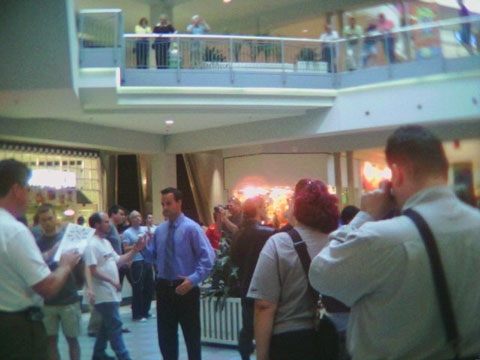
Although the robot scenario got most of the media attention, I think more passers-by noticed the Bose scene. But that might have been the more focused police presence.
Oh yeah, the cops. They weren't very happy with the event, but they stayed sufficiently distanced. Afterwards, they threatened legal action if -- get this! -- pictures of them showed up on the internet. The words "federal offense" were used. If anyone knows any kind of precedent for what sounds like preposterous babble, let me know.
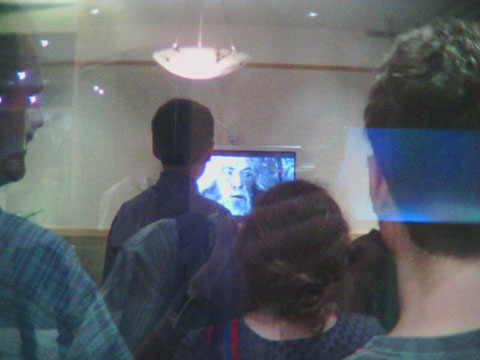
So was it fun? I'd say yes. We were trying to guess beforehand how many people would show up. I was thinking about 100, but it was only about two-thirds of that. But any more would have been dangerous.
Stay tuned for round two.
Press Roundup:
Historical Links:

